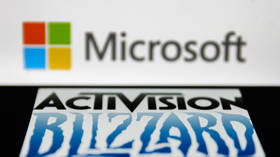EU approves Microsoft’s revised Activision takeover bid


The EU has given Microsoft the green light to acquire Activision Blizzard for $69 billion, the European Commission announced on Monday, countering opposition to the deal from both UK and US regulators. The acquisition would put Microsoft in control of top-earning franchises like Call of Duty, World of Warcraft, Overwatch, Hearthstone, and the Candy Crush Saga.
The EC’s decision explained Microsoft had fully addressed the regulator’s concerns about anti-competitiveness found during its investigation of the proposed deal by offering to provide free ten year licenses to European gamers who wanted to stream Activision games on non-Microsoft cloud gaming services.
The investigation had originally determined the deal would have harmed competition in both the distribution of console and PC video games and the supply of PC operating systems. Specifically, if Microsoft made Activision’s games exclusive to its ‘Game Pass Ultimate’ cloud streaming service, gamers would have fewer reasons to use other services; while, if Microsoft hobbled the streaming of Activision games on non-Windows operating systems, gamers would move away from those.
The EC’s proposed remedy required that the company guarantee gamers’ right to stream all Activision games with any cloud game streaming platform, onto any device, using any operating system. EU competition commissioner Margrethe Vestager reasoned Microsoft’s proposal was close enough, arguing the move would bring Activision’s games to “many more devices and consumers than before thanks to cloud game streaming.”
While the European and UK regulators agreed the original deal was both unlikely to warp the wider market for console games and a significant hazard to competition within the niche market of cloud gaming, the two disagreed on whether Microsoft’s revisions sufficiently addressed that threat.
The UK’s Competition and Markets Authority, which blocked the transaction last month, slammed Microsoft’s concessions as another form of anti-competitive manipulation, suggesting they would “allow Microsoft to set the terms and conditions for this market for the next ten years.” The very act of making such promises would set an example that future competitors would have to follow, the CMA reasoned, especially because the cloud gaming market was new and changing rapidly.
Microsoft has appealed the CMA’s decision. Meanwhile, in the US, the Federal Trade Commission is also suing to block the deal, and unless Microsoft can win over one of the two, it is unlikely to go forward despite winning the confidence of smaller regulators in Brazil, Japan, Chile, Saudi Arabia, and South Africa.